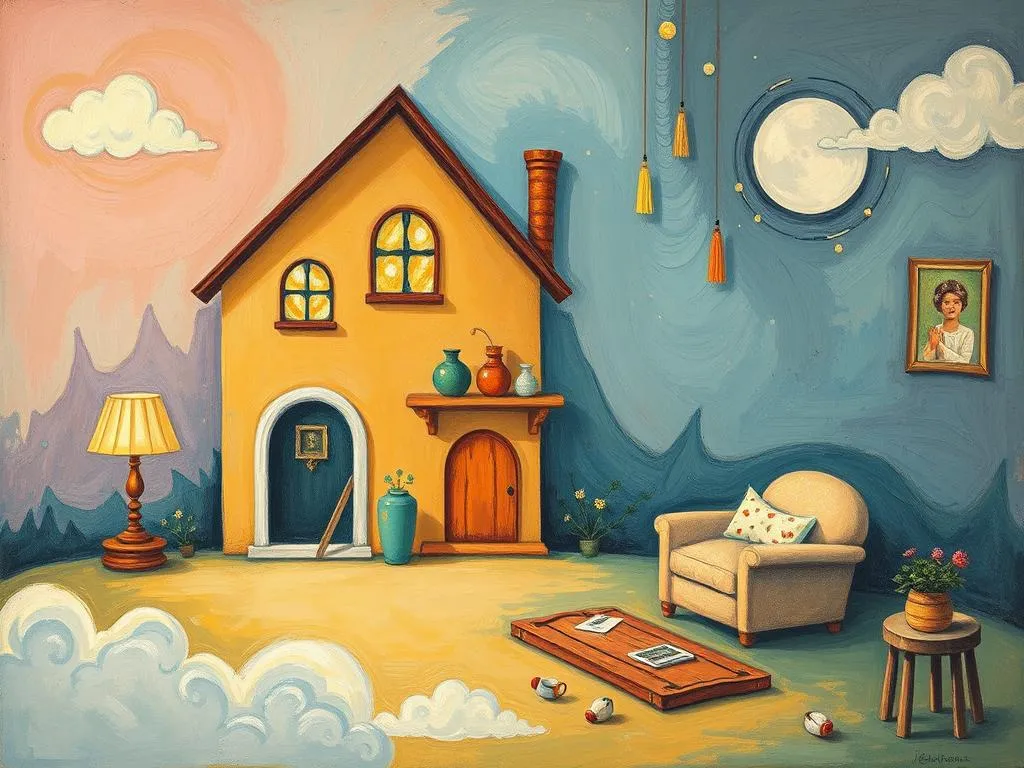
Have you ever found yourself wandering through a house that feels strangely familiar yet completely foreign? This is a common theme in dreams, often described as an “opposite home.” These dreams can evoke feelings of nostalgia, confusion, or even dread. The house may represent a childhood home, a place you’ve never lived, or an amalgamation of various spaces from your past. As you navigate through its rooms, you may find that it reveals more about your psyche than you initially realize.
Dreams involving opposite homes can serve as a gateway to understanding our deepest emotions, unresolved conflicts, and evolving identities. They often reflect our current life circumstances, relationships, and aspirations. As we delve into the symbolism, experiences, and personal growth associated with these dreams, you’ll find that they may hold the keys to unlocking your potential and addressing your inner turmoil.
The Enigma of Home: Symbol Analysis
Home is a powerful symbol in dreams, representing our sense of security, identity, and belonging. However, when we encounter an opposite home, the symbolism takes on a more complex dimension. Here, the house becomes a mirror reflecting our inner state, revealing feelings of displacement or conflict.
-
The Foundation of Self: A home often symbolizes our core identity. The presence of an opposite home in your dreams may indicate that you are questioning who you are or where you belong in your waking life. It’s a reminder that your identity is not fixed; it can shift as you evolve through various life experiences.
-
The Walls of Memory: Rooms can represent various aspects of your life—childhood memories, family dynamics, or even past relationships. An opposite home may suggest that you are revisiting memories or emotions that you thought were resolved. It can indicate a need to confront the past and understand how it shapes your present.
-
The Doorway to Change: An unfamiliar home can signify new beginnings or changes that you are currently facing. It might be a prompt from your subconscious urging you to embrace transformation or consider new opportunities that lie ahead.
-
The Fragility of Comfort: Opposite homes often elicit feelings of discomfort or unease. This sensation can symbolize the fragility of your current state of comfort. It may suggest that you are in a transitional phase, grappling with the uncertainty that comes from stepping out of your comfort zone.
-
The Journey of Self-Discovery: Ultimately, the dream of an opposite home can be a call to embark on a journey of self-discovery. It encourages you to explore your feelings, confront your fears, and acknowledge the changes that are unfolding in your life.
Exploring the Unknown: Experience Analysis
Understanding the nuances of dreams often involves examining specific scenarios. Here are a few common experiences you might encounter in dreams of opposite homes, each shedding light on different aspects of your life.
-
Wandering Through a Childhood Home: You find yourself in a house that looks like your childhood home but feels different. You notice new rooms that were never there in your real childhood. This may indicate a desire to reconnect with your roots or unresolved feelings from your past. Consider what these new rooms represent for you; they may symbolize growth or aspects of your life you have yet to explore.
-
Lost in a Strange House: You are navigating through a house that feels unwelcoming and disorienting. You can’t find your way out. This scenario often reflects feelings of being overwhelmed in your waking life. It could signify uncertainty about a current situation, whether that be in your career, relationships, or personal aspirations. Ask yourself: where am I feeling lost or trapped?
-
Discovering Hidden Secrets: As you roam the opposite home, you stumble upon hidden spaces or forgotten objects that trigger memories or emotions. This dream can signify the unearthing of repressed feelings or ideas. You might be processing grief, regret, or nostalgia—elements of your life that need to be acknowledged and integrated into your current self.
-
Renovating the Space: In your dream, you are actively renovating or redecorating the opposite home, transforming it into a space that feels right for you. This may symbolize your desire for change and growth. You are taking control of your life and redefining your identity. Reflect on what changes you wish to make in your waking life and how you can actively pursue them.
-
Meeting Strangers in Familiar Spaces: You encounter unknown people in a house that feels familiar. This can represent the integration of new influences or perspectives in your life. These strangers may symbolize aspects of yourself that you have yet to explore or embrace. Consider who these figures may represent in your life and what they might be teaching you.
Building Bridges: Personal Growth
Dreams of opposite homes can be more than mere reflections of your subconscious; they can serve as catalysts for personal growth. By engaging with the themes and symbols presented in these dreams, you can embark on a transformative journey.
-
Embrace the Discomfort: Instead of shying away from the feelings of unease that arise from these dreams, lean into them. Discomfort can be a powerful teacher. It often signals areas in your life that require attention or change. Acknowledge these feelings and ask yourself what they are guiding you to confront.
-
Revisit Your Roots: Use the dream as an opportunity to reflect on your past. What memories or emotions are surfacing? You may find that revisiting these aspects leads to healing and clarity. Consider journaling about your experiences or discussing them with a trusted friend.
-
Set Intentions for Change: If you find yourself dreaming of an opposite home, take it as an invitation to set intentions for your life. What aspects of your life would you like to transform? By articulating these intentions, you empower yourself to take actionable steps towards your desired future.
-
Explore Your Identity: Use the dream as a launching pad to explore your evolving identity. Who are you becoming? What parts of yourself have you neglected? Engaging in creativity, whether through art, writing, or music, can help you express and understand these shifts more deeply.
-
Seek Balance: Finally, aim for balance in your life. If the dream evokes feelings of chaos or uncertainty, consider what areas of your life may require more stability. Implement practices like mindfulness or meditation to foster a sense of calm and clarity.
Reflecting on the dream of an opposite home can illuminate the complexities of your emotional landscape. As you navigate these dreams, remember that they are not merely random images but profound messages from your subconscious. They invite you to explore your fears, dreams, and desires, guiding you toward personal growth and self-discovery.
In closing, allow yourself to sit with the feelings that arise in these dreams. They are your subconscious urging you to listen, learn, and grow. What might your opposite home reveal about your journey? As you explore this question, you may uncover the hidden treasures of your own heart and mind, paving the way for a more authentic and fulfilling life.







